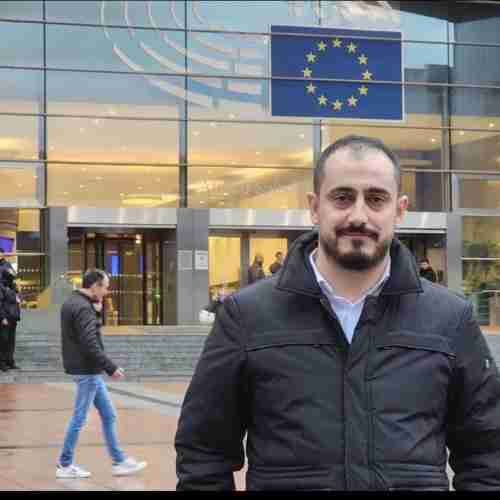ERBIL, Kurdistan Region of Iraq - Safeen Dizayee, the Kurdistan Region’s top diplomat, sat down with CNN’s Richard Quest at the Kurdistan House in Davos on the sidelines of the World Economic Forum to answer a series of questions with respect to Trump’s return to power, most recent developments in the Middle East, the future of Kurds in Syria, Bashar al-Assad’s ouster, and Erbil-Baghdad relations.
The Wednesday conversation started off by discussing Trump and his new administration, analyzing a comparison between his first and second term as President.
President Donald Trump’s second term is different from the first one, as this time he means “business” by making "rapid changes" and implementing new policies as soon as he took office as the President of the United States of America, Dizayee said.
When asked about Trump implementing policies right off the bat, Dizayee replied: “True, but with rapid changes in the region. I think there are times when people feel that the machine in the United States moves very slowly.
Safeen Dizayee, head of the Kurdistan Region’s Foreign Relations Department (DFR), says President Donald Trump’s second term is different from the first one, as this time he means “business” by making rapid changes and implementing new policies as soon as he took office as the… pic.twitter.com/azWjYYgRZy
— The New Region (@thenewregion) January 23, 2025
He went on to detail that "the fact that he has moved so rapidly is an indication that this time he means business."
Dizayee added that the team Trump has picked for his administration are "key people, key individuals, I would say are up to the job, and we have personal relations or let's say knowing them on a personal level so this would be easier for us to find access,” to deal with the new Trump administration, as the Kurdistan Regional Government (KRG).
Dizayee is part of a delegation led by Kurdistan Region Prime Minister Masrour Barzani, along with 20 other investors and businessmen to Davos.
Syria and recent developments
Dizayee says the blitz spearheaded by the Hay’at Tahrir al-Sham, leading to the collapse of the Assad regime in less than two weeks, came as a “surprise” to everybody, including the current leadership in Damascus.
Dizayee added that they are confident that the new administration in Damascus will guarantee the rights of components in the country as they have been “very receptive to development, to co-existence” and for an “inclusive future” for all Syrians.
The Kurdistan Region’s DFR head Safeen Dizayee says the blitz spearheaded by the Hay’at Tahrir al-Sham, leading to the collapse of the Assad regime in less than two weeks, came as a “surprise” to everybody, including the current leadership in Damascus.
— The New Region (@thenewregion) January 23, 2025
Dizayee added, as the… pic.twitter.com/m0V9fjBzkX
"The Kurds in Syria were denied any rights, many of them were even denied citizenship, so there has to be efforts towards equal citizenship first and foremost, and rights of the communities,” Dizayee said.
Dizayee’s comments come as Prime Minister of the Kurdistan Region Masrour Barzani met with Syria’s Foreign Minister Asaad al-Shaibani in Davos on Thursday, discussing the need for safeguarding the rights of Kurds in Syria, preserving stability, and latest regional developments.
No longer just ‘mountains’ but ‘international friends’
Part of the discussion between Dizayee and CNN’s Quest centered around the Kurdistan Region and Iraq.
Speaking of the current situation in the Kurdistan Region amid outstanding issues between Baghdad and Erbil, Dizayee said Kurdish people have always been “resilient through thick and thin.”
He added the Kurdistan Region is on the path toward economic growth while saying the KRG has built strong relations with the international community through diplomatic channels, saying if the Kurds had only mountains as friends in the past, “today we have many international friends."
Erbil and Baghdad are engaged in deeply-rooted outstanding financial issues, with both sides trading accusations at the other for the problems.
Years of conflict and unresolved issues between Erbil and Baghdad, and economic sanctions and pressure on Erbil by federal authorities, have pushed employees in the Region to live from paycheck to paycheck.
The KRG’s financial crisis was exacerbated in the wake of the halt of the Kurdistan Region’s oil exports following a court ruling on a dispute between Iraq and Turkey over Erbil’s independent oil sales.
Exports of the Kurdistan Region’s oil through the Turkish Ceyhan pipeline, where part of Kirkuk’s oil was also exported, were halted in March 2023 after Ankara lost a case against Baghdad in a Paris-based arbitration court. The case accused Ankara of breaching a 1973 agreement by allowing the KRG to start selling oil independent of Baghdad.
Speaking of the current situation in the Kurdistan Region amid outstanding issues between the Iraqi government and the Kurdistan Regional Government (KRG), Safeen Dizayee, the head of the Department of Foreign Relations of the KRG said Kurdish people have always been “resilient… pic.twitter.com/urijW5eujb
— The New Region (@thenewregion) January 23, 2025
"In the past, our goal has been to survive, but now we want to survive and thrive," Dizayee said. "I think what defines our relationship with Baghdad, is that we have a constitution.
"Quite often we have been making sure that okay, if we have a problem let's sit down and see what the constitution says.
"There are issues, and there is a roadmap [in the Constitution] on how to solve these issues, it can not be through the decision of an individual," he detailed.

 Facebook
Facebook
 LinkedIn
LinkedIn
 Telegram
Telegram
 X
X
